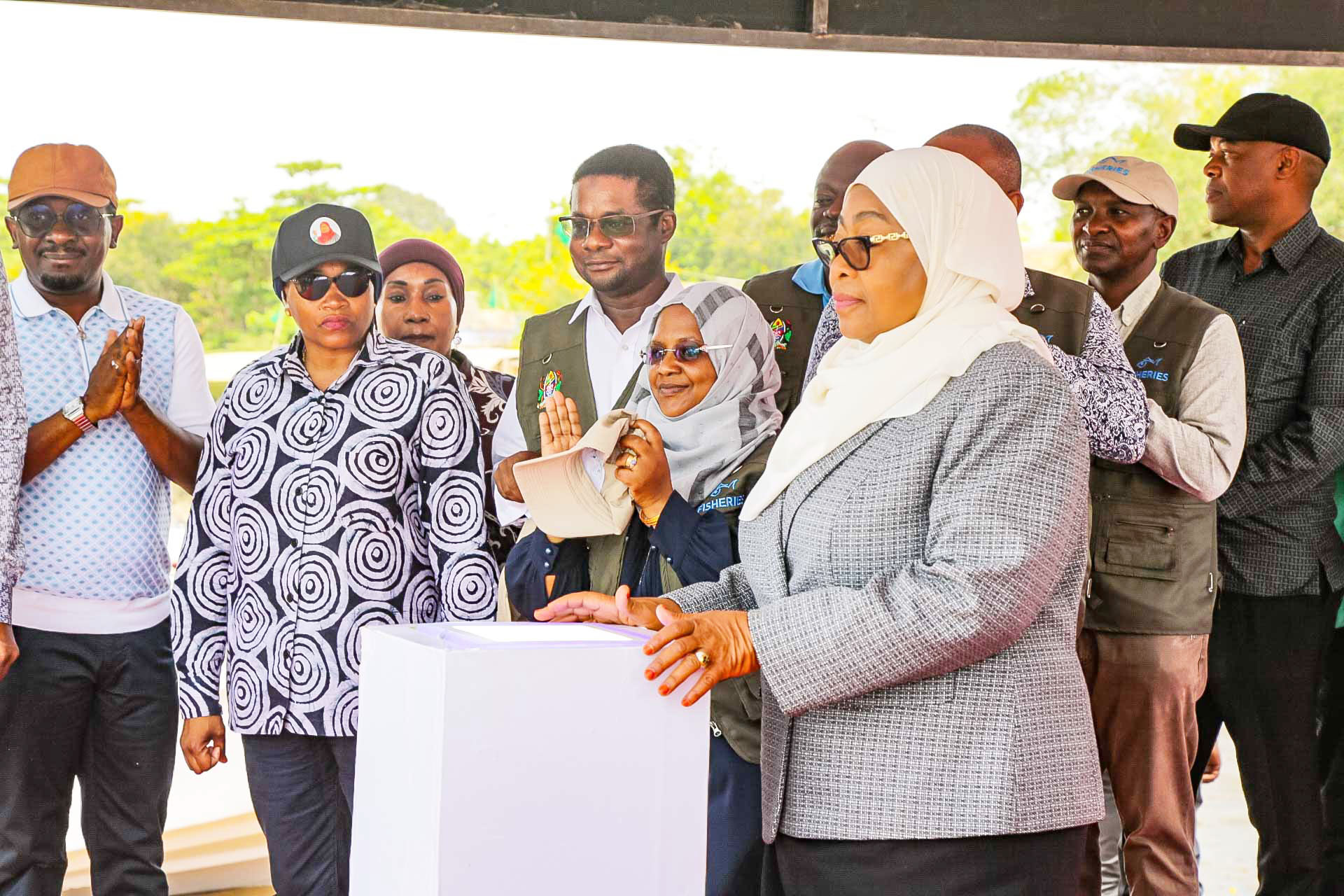Prime
Samia reveals plan to establish industrial sugar factory in Tanga

President Samia Suluhu Hassan speaks when handing over modern fishing boats in Pangani, Tanga Region, on February 26, 2025. Standing next to the Head of State is Livestock and Fisheries Development minister Ashatu Kijaji. PHOTO | CORRESPONDENT
What you need to know:
- The Head of State said the decision is part of her government’s strategy to reduce reliance on imported sugar and save foreign currency
Dar es Salaam. President Samia Suluhu Hassan on Wednesday announced plans to establish a new industrial sugar factory in the Tanga Region as part of her government’s strategy to reduce reliance on imported sugar and save foreign currency.
Speaking in Pangani during her regional tour, President Hassan said that the factory would be located near Tanga Port, with the main sugarcane estates positioned along the Pangani River Basin. The new facility is expected to boost local sugar production, create employment opportunities, and contribute to the economic growth of both Pangani and the wider Tanga Region.
The President also spoke of the ongoing Bagamoyo-Pangani-Tanga-Horohoro road project, which aims to enhance regional connectivity and stimulate trade, tourism and agriculture. The new road will link key economic zones, including the Bagamoyo Port and Special Economic Zone, the Port of Mombasa, and the Horohoro border with Kenya.
President Hassan reaffirmed her administration’s commitment to business-friendly policies, referencing her directive last year to the Minister for Agriculture, Hussein Bashe, and the Minister for Industry and Trade, Dr Selemani Jafo, to engage investors in exploring local industrial sugar production.
“As a government, we are ready to adjust policies to ensure the business community operates more effectively,” she said in August last year at the launch of an expansion project at Kilombero Sugar Company Limited (KSCL).
She said that establishing an industrial sugar factory in Tanga would help conserve foreign currency currently spent on sugar imports. Despite having several operational sugar factories, Tanzania has yet to produce industrial sugar locally.
Tanzania produced a total of 393,000 tonnes of sugar in the fiscal year 2023/24, according to data from the Ministry of Agriculture. The country’s demand for both household consumption and industrial use reaches around 630,000 tonnes. The country imports 250,000 tonnes of industrial sugar annually at a cost of about $150 million (Sh375 billion). President Hassan reiterated her long-standing goal of reducing this expenditure through increased local production.
This year’s domestic sugar target stands at 520,000 tonnes.
“The Pangani area has witnessed rapid development, and it will continue to transform as we roll out a major sugarcane estate project along the Pangani River Basin,” she said.
In addition to the sugar factory, President Hassan laid the foundation stone for the Bagamoyo-Makurunge-Pangani-Tanga road project, designed to improve transport infrastructure and facilitate trade and agricultural activities. The road will connect several key economic hubs, boosting regional commerce.
Works Minister Abdallah Ulega outlined the government’s infrastructure achievements, noting that several major bridge projects have been completed under the current administration. These include the Tanzanite Bridge in Dar es Salaam and the Kitengule and Msingi Bridges in Singida, costing a combined Sh381 billion. Additionally, 1,366 kilometres of tarmacked roads have been completed, valued at Sh2.7 trillion.
“The new road project in Tanga will feature a 525-metre bridge in Pangani, equivalent to five football pitches, alongside 25 kilometres of connecting roads,” Minister Ulega revealed.
“The Pangani Bridge will be equipped with 240 lights, with plans for 200 more to be installed in the town itself,” he added.
Tanzania National Roads Agency (Tanroads) CEO, Mohamed Besta, reported that the road project is being implemented in four phases. The Tanga-Pangani road, currently 75 per cent complete, is being constructed by China Henan International Cooperation Group (CHICO) for Sh118 billion. The 525-metre Pangani Bridge, built by Li Chao Company Limited, is 53 per cent complete and costs Sh107 billion.
“The 95-kilometre section executed by China Railway 15th Bureau Group Co. Ltd (CR15) is under construction for Sh123 billion, while the Mkenge-Makurunge section remains under funding discussions,” Besta said.
African Development Bank’s Tanzania representative, Dr Patricia Laverley, commended the government’s commitment to modern infrastructure, stressing its role in economic development. She also underscored the strategic importance of Tanga Port for the East African Crude Oil Pipeline (EACOP) project, which will transport crude oil from Uganda to global markets.
“The road projects are critical for the region’s economic integration, and we are proud to support the EACOP, which will enhance regional energy security,” Dr Laverley stated.
Earlier, President Hassan launched the second phase of a Sh11.5 billion initiative distributing 120 modern fishing boats to coastal and inland regions. Of these, 70 boats were allocated to the coastal regions of Tanga, Coast, Dar es Salaam, Lindi, and Mtwara, while 50 were designated for inland waters, including Lakes Victoria, Tanganyika, and Nyasa.




